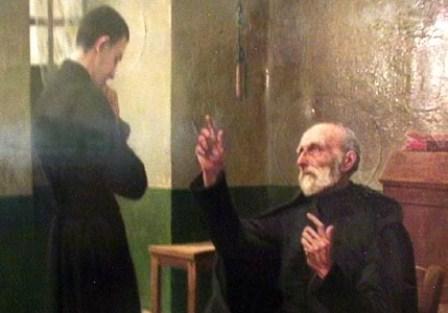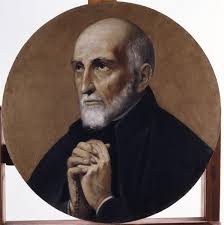
St. Alphonsus Rodriguez was a Jesuit brother who overcame great personal tragedy to become a kindly and esteemed porter and spiritual advisor. Alphonsus was born at Segovia, Spain in 1533 to a prosperous cloth merchant and his wife. The family hosted a young [St.] Peter Favre (Faber) for an extended stay when he had come to Segovia for a preaching campaign. Favre, a young priest at the time, was the first to join [St.] Ignatius of Loyola in the initial formation of the Society of Jesus. He prepared the boy Alphonsus for his First Communion. At age twelve, Alphonsus was sent to study at a newly established Jesuit college at Alcala. During his first year, however, his father died, and he returned home because he was needed to help run the family business. With time, he himself took over management of the cloth business.
JOYS AND SORROWS
When he was in his twenties, he married a woman named Maria Suarez. The couple was fruitful, but the marriage was marked by sorrow, with one child dying, followed by Maria herself dying in childbirth. Left with one child, Alphonsus also faced the reality of a failing business, mostly due to heavy taxation. Thus, he sold the business. When both his mother and his one remaining child both died, Alphonsus was crushed and considered himself a failure. He began a life of prayer and penance, and he decided to turn for spiritual direction to the Jesuits, who had established themselves in Segovia by then. During these years of prayer and grief, Alphonsus made great spiritual advances, desiring to dedicate the remainder of his life to God by abandoning secular life for religious life.
ROUGH ROAD TO THE JESUITS
With time and much prayer, Alphonsus decided to seek admittance to the Society of Jesus. They rejected him, mostly because of his lack of education, but also because his severe penances had weakened his health. In his mid-thirties, and in an amazing act of humility, he decided to return to school at Valencia with boys who were two decades younger than him. He was again rejected by the Jesuits there. Finally, the Jesuit provincial intervened and allowed him admittance as a lay brother, so he entered in early 1571 and began his novitiate. Six months after his entry, he was sent to the Jesuit college of Montesion in the city of Palma on the Spanish Island of Majorca, where he completed his novitiate.
A HOLY PORTER
He was assigned there as a door-keeper or porter. He made his final vows there at age fifty-four. It was in his service as a humble porter that Alphonsus found his special niche. His daily duties included answering the door and welcoming visitors, being sent on errands, disbursing alms to the needy who came for help, and fetching a student or Jesuit who had a visitor.
The job that Alphonsus most excelled at was as a consoler of troubled hearts. His experiences of such immense personal loss gave him a unique compassion, and he gained great popularity for his kindness as a listener and wisdom as an adviser. He said he viewed each visitor ringing the bell as if it was Christ Himself Who sought assistance. He was trusted not only by visitors but also by the students, who would seek him out for spiritual advice. One particular student, a young [St.] Peter Claver, chose Brother Alphonsus as his spiritual advisor. Filled with zeal, but needing direction, Claver became close to the humble porter, then in his seventies. It was Brother Alphonsus who encouraged Claver to go to the missions in South America and tend to the needs of the victims of slavery. As a religious brother, he was consistently obedient, and found a way to always be in prayer even when occupied with a task. He was known in particular for his devotion to the Immaculate Conception of the Virgin Mary more than two hundred years before that declaration was dogmatically made by the Church.

SICKNESS AND DEATH
In his old age, Alphonsus was plagued by physical and spiritual difficulties. His severe penances left him very frail, and he experienced spiritual aridity and even demonic harrassment. In his last months, his memory began to fail, and he was grieved that he could no longer remember his favorite prayers. He died at Montesion on November 1, 1617 at age eighty-four.
St. Alphonsus Rodriguez was not like his contemporary fellow Jesuits who sailed bravely to foreign lands to bring the Gospel to the ends of the earth. His was a simple, humble mission of no less importance. His memoirs, which were examined after his death, reveal a life of rich prayer including even visions and ecstasies. He showed heroic virtue in overcoming terrible tragedy and loss to grow in faith, rather than abandoning it. He was canonized with his friend Peter Claver in 1888. He is the patron of the Spanish Island of Majorca, and his shrine is located at the Jesuit college in Palma. His feast day is October 31.
